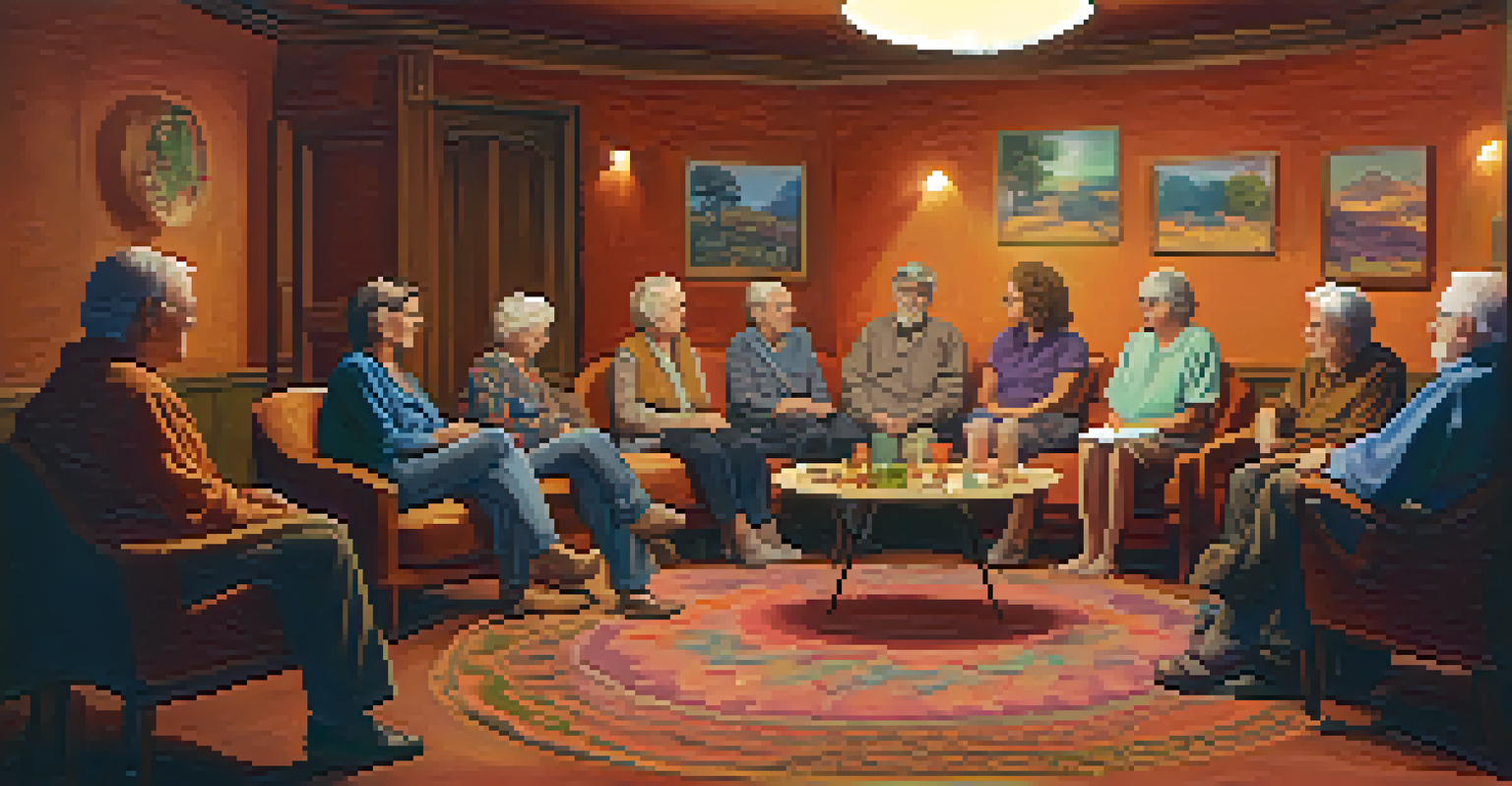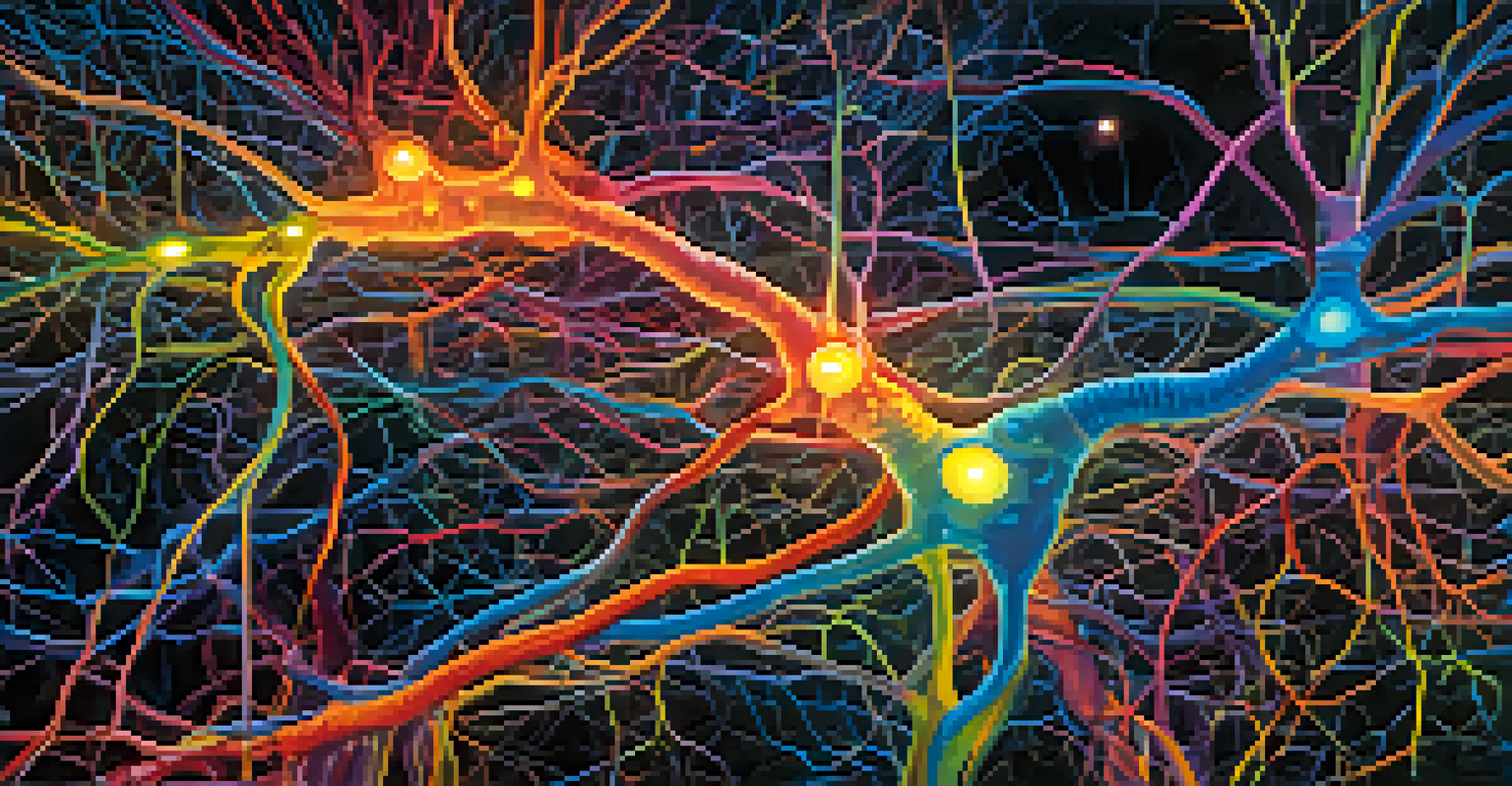Psychedelic Therapies: Transforming Aging Experiences

Understanding Psychedelic Therapies and Their Benefits
Psychedelic therapies involve the use of substances like psilocybin and MDMA to facilitate healing and personal growth. These substances have been studied for their potential to alleviate various mental health conditions, such as depression and anxiety, which often accompany aging. By tapping into altered states of consciousness, individuals can confront and process unresolved emotions, leading to profound insights.
Psychedelics can help break the cycle of despair that some seniors experience.
For older adults, the journey can be particularly transformative. Aging can bring about feelings of loss, loneliness, and existential dread. Psychedelic experiences provide a unique opportunity to address these feelings, allowing individuals to find meaning and connection in their lives.
Moreover, the therapeutic setting in which these substances are administered promotes safety and support, essential for older adults who may be wary of trying something new. As research continues, the potential benefits of these therapies for aging populations become increasingly compelling.
The Role of Psychedelics in Mental Health for Seniors
Mental health issues such as depression and anxiety can significantly affect the quality of life in older adults. Psychedelic therapies have emerged as a promising alternative or adjunct to traditional treatments. By fostering a sense of connection and introspection, these therapies can help break the cycle of despair that some seniors experience.

Studies have shown that psychedelics can lead to lasting changes in perspective, often resulting in reduced symptoms of anxiety and depression. This is particularly important for aging individuals who may feel stuck in negative thought patterns. The experience can help them re-evaluate their lives and cultivate a more positive outlook.
Psychedelics Help Seniors Heal
Psychedelic therapies offer older adults a unique opportunity to confront unresolved emotions, leading to profound personal growth and healing.
Additionally, the communal aspect of some psychedelic therapy sessions can combat loneliness, a common issue among seniors. Sharing experiences in a safe environment fosters a sense of belonging and understanding, reinforcing the idea that they are not alone in their struggles.
Exploring the Science Behind Psychedelics
The resurgence of interest in psychedelics has been backed by a growing body of scientific research. Neuroscience studies indicate that psychedelics can promote neuroplasticity, the brain's ability to adapt and reorganize itself. This is particularly relevant for older adults, as neuroplasticity can help mitigate cognitive decline.
The potential for psychedelics to enhance quality of life in seniors is garnering attention from healthcare professionals.
Research suggests that psychedelics may enhance emotional processing and reduce fear responses, which can aid in confronting past traumas or regrets. By promoting a state of openness, these substances allow individuals to explore deep-seated emotions that may have been long buried.
As more clinical trials focus on aging populations, we are beginning to understand how these substances interact with the brain. This knowledge is crucial for developing safe and effective treatment protocols tailored to the unique needs of seniors.
Personal Stories: Transformative Experiences
Many individuals have shared their transformative experiences with psychedelic therapies, highlighting the profound shifts in their perspectives on aging and life. One elderly participant described how a guided psilocybin session helped her process the grief of losing her spouse, leading to a newfound appreciation for the beauty of life.
These personal narratives often emphasize feelings of interconnectedness and acceptance that arise during psychedelic experiences. For seniors, this can be a powerful antidote to the isolation and despair that sometimes accompany aging.
Community Reduces Senior Loneliness
The communal aspect of psychedelic therapy sessions fosters a sense of belonging among seniors, combating feelings of isolation and despair.
Such stories not only shed light on the emotional benefits of these therapies but also inspire others to consider how psychedelics might enhance their own aging experiences. The potential for growth and healing is a compelling reason to explore this avenue.
Challenges and Considerations for Older Adults
While the potential benefits of psychedelic therapies are exciting, there are also challenges to consider, especially for older adults. Health conditions and medications can affect how psychedelics are processed in the body, making careful medical supervision essential. This ensures the safety and effectiveness of the treatment.
Moreover, older adults may have preconceived notions or fears about drug use that can hinder their willingness to try such therapies. Addressing these concerns with empathy and education is crucial in fostering openness to the potential benefits.
Lastly, the legal landscape surrounding psychedelics varies significantly by location. It's important for individuals to stay informed about the regulations in their area and seek out licensed practitioners who can guide them through the process safely.
The Future of Psychedelic Therapies in Aging
As research into psychedelic therapies continues to expand, the future looks promising for integrating these treatments into elder care. Ongoing studies aim to establish standardized protocols and dosage guidelines specifically for older adults, addressing their unique needs and health considerations.
The potential for psychedelics to enhance quality of life in seniors is garnering attention from healthcare professionals and researchers alike. This could lead to a paradigm shift in how we approach mental health and wellness in aging populations.
Research Supports Psychedelic Use
Growing scientific research highlights the potential of psychedelics to enhance neuroplasticity and emotional processing in aging populations.
As more success stories emerge, it is likely that psychedelic therapies will gain acceptance and become a viable option in mainstream medicine, revolutionizing the way we support aging individuals on their journey toward emotional and mental well-being.
How to Get Started with Psychedelic Therapies
For those interested in exploring psychedelic therapies, the first step is to seek out qualified professionals who specialize in this field. It's essential to find practitioners who are experienced in working with older adults and can provide a safe, supportive environment.
Participating in guided sessions, whether in a group or one-on-one setting, can help mitigate anxiety and enhance the overall experience. Trusted therapists will not only facilitate the session but also provide post-experience integration support, helping individuals make sense of their journey.

Additionally, staying informed about the latest research and developments in the field will empower seniors to make educated decisions about their mental health. As the stigma surrounding psychedelics diminishes, more resources will become available, paving the way for a brighter future in aging experiences.